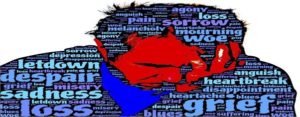The Many Sides of Bereavement
Death of a Loved One
We feel bereavement when someone close to us dies. We can feel anticipatory grief, or emotional pain at the knowledge that someone close to us will die soon. A pets’ death can equally emotionally overwhelm us. The impact of bereavement on us naturally depends upon just how close we were to the person who died. I personally believe that the key concept with grief to discuss is the very connection between ourselves and that special other that is now severed, and that we miss so much. That exceptional understanding that exists between two souls that cannot be replaced once gone. This is what causes our pain.
Psychology Today states that a wide and confusing range of emotions may be experienced after a bereavement. We may feel numb, we may dissociate, cry, suffer insomnia, eat less or eat more, find it hard to focus at work, feel denial, anger, guilt at unfinished business, or have a myriad of mood swings. Bereavement is unique for us all.
With Covid 19 added to the mix, the death of a loved one has been made ever more traumatic, especially when, during lockdown, we could not be in the same room as the dying person, could not touch them, hug them, hold them or tell them face to face how we felt about them. We could not get to say all the final things face to face that help us process the impending death of someone we love.
We were left with face time on line if the dying person was able for it. As for the funeral itself, we had to make do with an online link to view the event without being able to have all the family support that would usually be there for us at a normal funeral, such as being able to talk to other family members, hug them, cry with them and share a cup of tea and few sandwiches later on to help process the sadness of the day. We could not properly mourn the death of our loved ones. Instead we have been left isolated at home to cope with our difficult and painful feelings. Many clients have reported that not being able to speak to their loved ones before death, or to hug them and say their last goodbyes was overwhelmingly traumatic for them.
Bereavement is Not Only Associated with Death

It would be naïve to believe that feelings of grief and loss only occur with death. In my experience, bereavement is indeed many sided. We can equally feel bereaved when we experience the breakdown of relationships, be they marital breakups, the end of friendships, when friends or family move away, or when we are kept apart from those we love against our will and become estranged from them over time. These emotionally painful experiences can feel like death, or feel traumatic, when the special connection of these relationships are broken. Some of my clients’ express feelings of anxiety or panic when they cannot access that all too familiar and much needed safety and trust with someone anymore.
As for myself, I have experienced being kept apart from extended family as a child and not having the opportunity to reacquaint myself with them until I became an adult. I experienced huge grief as a child that to me, felt like a strange kind of death because they were all still alive but I could not get to them. I missed the love and support, understanding and regular interactions with my family terribly. I missed the birthdays and other events that took place without me. As an adult this left me feeling a confusing mixture of emotions when finally meeting them again. I felt close to them yet so apart from them, as I love them the same as I have always done as a child. Though I also feel that I am not as intimately connected anymore. I feel like I don’t know them as well as I once did. There is a strange and unwelcome gap now between us. I believe bereavement and estrangement to be very closely linked with much of the same feelings involved.
The only way I can remedy my situation as it stands today is through biting the bullet, and meeting with my estranged family members as often as I can to break the ice and rebuild those connections again, even if I do feel out of place or unsure of my place with them sometimes. So exposure therapy is working well for me.

The important thing to remember with bereavement is that we each cope with or experience it uniquely. We each heal from it at different speeds. Sometimes we never fully heal but learn to manage the feelings of pain and loss through talking to those we trust, through reliving happy or sad memories with others that can help us work through and process our feelings, try to make sense of them, and let them go. In this way, we can still take part in the world around us and enjoy the other relationships that we still have.
Of course, therapy can be a vital part of processing our grief and freeing our minds enough from the pain to carry on with ourselves without feeling quite so incapacitated by feelings of loss and disconnection whether this was caused by bereavement from a death or estrangement from someone.
Remember that grief comes in waves. It can ebb away for a time but come in again like the tide. Sometimes we may feel that we are managing well with our feelings and may do so for a long time until a song is played, or a film is shown, or until visiting a place frequented by someone we have lost, reminding us strongly of them and we feel overwhelmed all over again. It is therefore important to be patient with ourselves and not berate ourselves for getting caught up in the upset again. We feel so much upset because we loved so strongly in the first place. There is no fast-forward button to press to speed us through it, bereavement must be felt, and sat with, explored and talked through and thought about until it naturally runs its course.
This article was written by Michelle Fowler, newly qualified and pre-accredited psychotherapist at The DMC Clinic. If you have experienced, or are experiencing any of the issues mentioned in this article, please contact The DMC Clinic to make an appointment with a counsellor or psychotherapist.
References:
Psychology Today, (2022). Bereavement.
https://www.psychologytoday.com/ie/conditions/bereavement#symptoms
Health Service Executive, (HSE)., (2021). Coping with grief after bereavement or loss.
https://www2.hse.ie/wellbeing/mental-health/bereavement-and-loss.html









